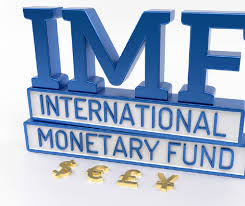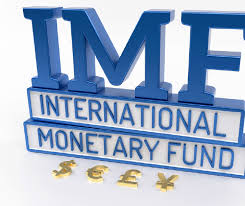
Following a request by the Argentine government, the International Monetary Fund (IMF) announced that it would increase the emergency bailout amount for the country from $50 billion to $57.1 billion. This was announced by the Finance Minister of Argentina, Nicolas Dujovne.
Dujovne said that the agreement "will allow our country to leave behind the turbulent path of recent months", at a press conference alongside IMF Managing Director Christine Lagarde.
The bailout program for Argentina is aimed at helping the country to "face its challenges" and provide support to the most vulnerable populations.
IMF's Executive Board and Argentina's Congress however still have to approve the agreement.
Initially, the IMF agreed to a bailout package of $50 billion for Argentina and $15 billion of that amount has already been handed over to the Argentine government.
But the deteriorating economic condition in the country forced Argentine President Mauricio Macri last month to request the IMF for hastening of the furnishing of the remaining $35 billion. Under the original agreement, the next instalment of $3 billion was to be handed over by the Fund in November and the rest through the next three years.
The Fund said in a statement that the new deal "front loads IMF financing." According to Argentina's finance ministry, the amount due to be disbursed by the Fund by the end of 2019 has been increased by $19 billion out of a total of $36.2 billion.
The statement of the ministry also added that the above agreement clause with the IMF also includes a commitment from Argentina to maintain "spending on social assistance... above 1.2 percent of gross domestic product" in order to "protect the most vulnerable sectors."
Argentina has "developed a strengthened economic plan that is aimed at bolstering confidence and stabilizing the economy," Lagarde said. "A central element of the authorities' plan will be to reach budgetary balance by 2019."
It should be mentioned that just a day before the conclusion of the agreement with th I<F> the head of the country’s central bank resigned.
According to some analysts, one of the major reasons for replacement of the central bank chief of Argentina Luis Caputo was because of his disagreement with the IMF over Argentina's monetary strategy.
Lagarde said that "persistently high inflation continues to erode the foundation of economic prosperity in Argentina" and to tackle it, the country's "authorities will shift towards a stronger, simpler, and verifiable monetary policy regime."
She also hoped that Argentina would "contain the supply of money, and keep short-term interest rates at their currently" record highs of 60 per cent aimed at drastically bring down the rate of inflation which is predicted to touch a staggering 40 per cent by the end of the current year.
Laragrde also added that the Argentine central bank had "agreed to adopt a floating exchange rate regime, without intervention."
The Central Bank of Argentina would maintain "strict control of growth of the monetary base in order to reduce inflation" and would also fix upper and lower limits for it.
(Source:www.france24.com)
Dujovne said that the agreement "will allow our country to leave behind the turbulent path of recent months", at a press conference alongside IMF Managing Director Christine Lagarde.
The bailout program for Argentina is aimed at helping the country to "face its challenges" and provide support to the most vulnerable populations.
IMF's Executive Board and Argentina's Congress however still have to approve the agreement.
Initially, the IMF agreed to a bailout package of $50 billion for Argentina and $15 billion of that amount has already been handed over to the Argentine government.
But the deteriorating economic condition in the country forced Argentine President Mauricio Macri last month to request the IMF for hastening of the furnishing of the remaining $35 billion. Under the original agreement, the next instalment of $3 billion was to be handed over by the Fund in November and the rest through the next three years.
The Fund said in a statement that the new deal "front loads IMF financing." According to Argentina's finance ministry, the amount due to be disbursed by the Fund by the end of 2019 has been increased by $19 billion out of a total of $36.2 billion.
The statement of the ministry also added that the above agreement clause with the IMF also includes a commitment from Argentina to maintain "spending on social assistance... above 1.2 percent of gross domestic product" in order to "protect the most vulnerable sectors."
Argentina has "developed a strengthened economic plan that is aimed at bolstering confidence and stabilizing the economy," Lagarde said. "A central element of the authorities' plan will be to reach budgetary balance by 2019."
It should be mentioned that just a day before the conclusion of the agreement with th I<F> the head of the country’s central bank resigned.
According to some analysts, one of the major reasons for replacement of the central bank chief of Argentina Luis Caputo was because of his disagreement with the IMF over Argentina's monetary strategy.
Lagarde said that "persistently high inflation continues to erode the foundation of economic prosperity in Argentina" and to tackle it, the country's "authorities will shift towards a stronger, simpler, and verifiable monetary policy regime."
She also hoped that Argentina would "contain the supply of money, and keep short-term interest rates at their currently" record highs of 60 per cent aimed at drastically bring down the rate of inflation which is predicted to touch a staggering 40 per cent by the end of the current year.
Laragrde also added that the Argentine central bank had "agreed to adopt a floating exchange rate regime, without intervention."
The Central Bank of Argentina would maintain "strict control of growth of the monetary base in order to reduce inflation" and would also fix upper and lower limits for it.
(Source:www.france24.com)





